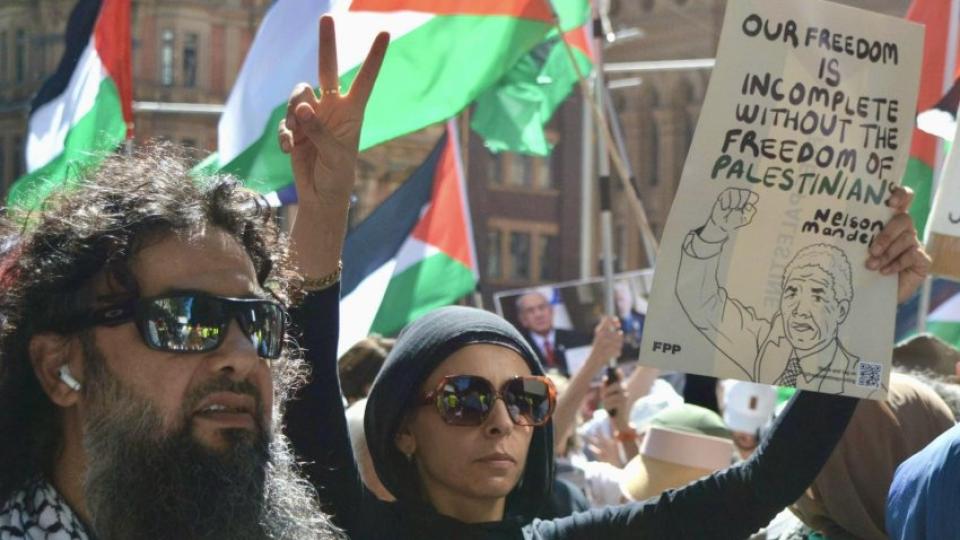Labor must listen to 81% saying ceasefire

Labor Prime Minister Anthony Albanese has always maintained that Labor cannot win popular support without conservative policies.
But the global movement for Palestine highlights how that could so quickly backfire, especially as Labor has backed Israel so solidly since October 7.
The Palestine solidarity movement is shaking politics up: 81% are now calling for Israel to ceasefire and 53% want the government to take more action to achieve a ceasefire. The movement demands that Labor stop weapons contracts with Israel, restore its UNWRA funding, and stop putting conditions on any ceasefire call is gaining traction.
More than 100 lawyers have now referred Albanese to the International Criminal Court as an accessory to genocide in Gaza. This is the first Western leader to be referred to the ICC under Article 15 of the Rome Statute.
After more than five months of sustained mass action, tens of thousands are still marching in the streets every weekend. In addition, other pro-Palestine events are being organised in unions, among community groups, on campuses, in councils and elsewhere.
Palestine is today's Vietnam
It’s an extraordinary time. Some anti-war activists say “Palestine is today’s Vietnam”.
Five decades ago, Vietnam’s anti-colonial struggle for independence — first against the French colonists and then against the US imperialists — sparked a deeper understanding of capitalism and drew many into the solidarity movements.
Then, it took five years to get substantial numbers on the streets. That makes the sustained protests for Palestine happening now even more remarkable.
The Palestine solidarity movement represents a significant break with Labor and its political agenda. So many of its traditional support base, especially younger activists, are breaking from the party after realizing that Israel’s occupation of Palestine is wrong and that Gazans have a right to resist, including by armed struggle.
Gaza and Palestine have become the touch stone for political justice today — including for many unionists.
But, it is important to note that the Palestine protests have not relied on the traditional organisations of the working class. While many trade unions have passed ceasefire motions, they are not the backbone of the mobilisations, as they were during the opposition phase to the Iraq war.
The Australian Council of Trade Unions (ACTU) has passed two resolutions on Palestine, the first last October 19 and the second on February 23.
However, after five months of carnage in the Gaza Strip, the ACTU executive limits itself to safe topics: condemning attacks on civilians and reiterating the call from global unions for unified action following the International Court of Justice ruling.
While it does call for the funding to the United Nations Relief and Works Agency to be reinstated and says Labor must “exercise all avenues of influence and diplomacy” to stop the bombing and ground assault, its framing is still the specious “both sides” argument.
Significantly, too, the ACTU does not call on its member organisations to pull out all stops to support the weekly mass protests for Palestine.
Neither does it call for Australia to stop military exports, or components, to Israel — one of the most secretive, unaccountable weapons’ export industries in the world.
Departing Construction, Forestry, Maritime, Mining and Energy Union National Secretary Christy Cain has been one of the too few militant trade unionists pushing the ACTU and Labor to do a lot more to support Gazans and Palestinians.
AUKUS frames Labor's Gaza response
The Palestine justice movement is also forcing a discussion about Australia’s military alliance with the United States and Britain. AUKUS is one of the levers cementing Australia’s complicity in Israel’s war on Gaza that we have to break.
Australia’s complicity in Israel’s genocide in Gaza comes via Pine Gap, the US spy base near Alice Springs, which is providing intelligence to the Israeli Defense Forces.
Australia is also complicit in the bombing of the Houthis, in Yemen, who are trying to block weapons’ shipments to Israel. Labor has effectively taken Australia into another war without any public or parliamentary discussion.
Labor’s acceptance of the Coalition’s “defence” policy has to be challenged.
The gross misspend of $368 billion on nuclear-powered submarines when homelessness and food insecurity is on the rise is even being challenged by establishment figures, such as former PM Paul Keating and defence analyst Hugh White.
As the Palestine rallies show, a younger generation understand the parallels between Australian colonialism and Israeli colonialism. Many wave placards that say: “From the river to the sea, always was, always will be Aboriginal land”. They know you can’t oppose settler colonialism here while endorsing it in Palestine.
One third of those who voted in the last election were already voting against the major parties.
Will that trend continue? It seems likely given just how close, policy-wise, Labor is to the Coalition on Palestine, AUKUS, not to mention rising cost of living pressures, wages stagnation and housing precariousness.
Unconditional solidarity needed
Building a movement in unconditional solidarity with the Palestinians is urgent and necessary, and to do that requires a non-sectarian, non-dogmatic approach.
People are angry with Labor, particularly about Palestine, and that rage can be channelled into questioning the whole rotten capitalist system that is being unmasked by political parties turning a blind eye to the genocide in Gaza.
“In our thousands; In our millions; We are all Palestinians” is a reflection of our solidarity, and it is an important chant.
Most of us find it hard to wrap our heads around the horror of a genocide. We have to keep organising and protesting to ensure our common humanity prevails against their racist, destructive, profits-above-all-else system in which genocide is being normalised.
[Chloe DS is a member of the Socialist Alliance national executive. This article is based on an extract from a presentation she gave to the Socialist Alliance 18th National Conference in January.]